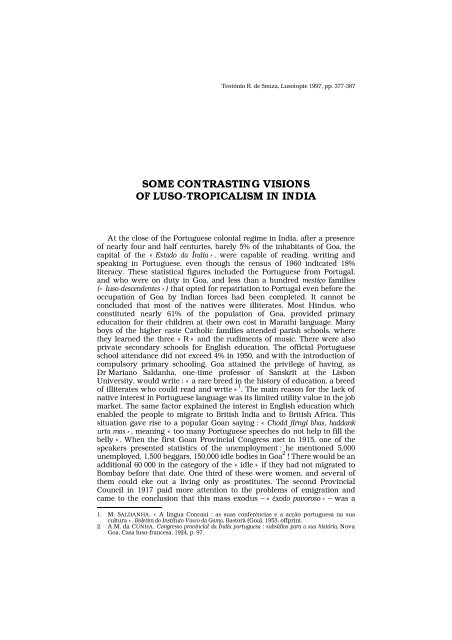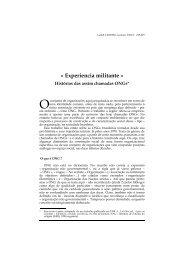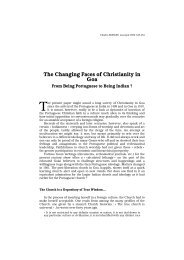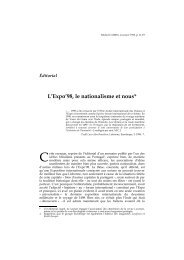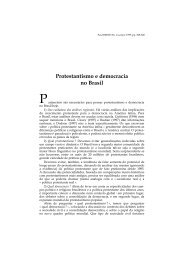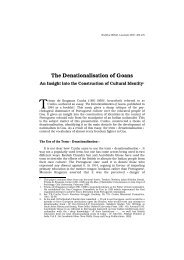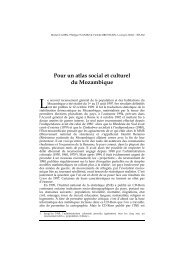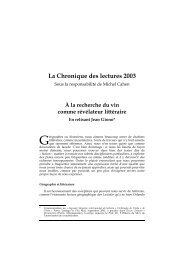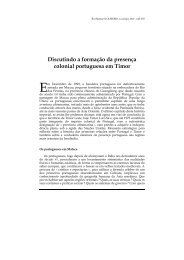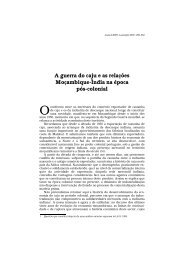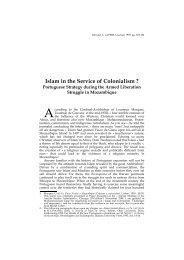some contrasting visions of luso-tropicalism in india - Lusotopie
some contrasting visions of luso-tropicalism in india - Lusotopie
some contrasting visions of luso-tropicalism in india - Lusotopie
You also want an ePaper? Increase the reach of your titles
YUMPU automatically turns print PDFs into web optimized ePapers that Google loves.
SOME CONTRASTING VISIONS OF LUSO-TROPICALISM IN INDIA 381false image <strong>of</strong> Goan culture. He then cites a former American ambassador<strong>in</strong> India, Mr. John Dean Gunther, for remark<strong>in</strong>g dur<strong>in</strong>g a visit to Goa byway <strong>of</strong> an advice to the locals : « You must give the tourists what you have !Not what he wants » 12 .Obviously Prabhakar Angle is on a war-path aga<strong>in</strong>st « <strong>luso</strong><strong>tropicalism</strong> »and exudes strong prejudices aga<strong>in</strong>st the style <strong>of</strong> liv<strong>in</strong>g and behav<strong>in</strong>g <strong>of</strong> theGoan Christians. Such an attitude takes him to easy generalisations, and toclose his eyes to obvious realities, even though they may affect only am<strong>in</strong>ority <strong>of</strong> the Goan population, namely about 35 % Goans who pr<strong>of</strong>essChristianity and had closer cultural-religious contact with the Portuguese.I wish to classify this type <strong>of</strong> writ<strong>in</strong>gs as « Priolkar-Angle literature ».A.K. Priolkar was a Bombay-based Goan Saraswat Brahm<strong>in</strong> who producedliterary output as l<strong>in</strong>guist and historian <strong>in</strong> the 1960s. His research served tobuttress pro-Marathi and pro-H<strong>in</strong>du <strong>in</strong>terests. He emphasized the excesses<strong>of</strong> Inquisition and the cultural backwardness <strong>of</strong> Goan Christians and theirConkani « dialect ». He reserved to Marathi the dist<strong>in</strong>ction <strong>of</strong> be<strong>in</strong>g the trueliterary and cultural language <strong>of</strong> Goa 13 .The reactions <strong>of</strong> Priolkar, Angle and several others need to beunderstood as part <strong>of</strong> the cultural resistance aga<strong>in</strong>st the disturb<strong>in</strong>g effect <strong>of</strong>the Portuguese colonial and missionary policies, and as such they are notwithout foundation. But it would be ridiculous to close one’s eyes to thereality and refuse to admit that the Portuguese presence did not leave deeptraces <strong>in</strong> India for good and for bad. It is a different issue altogether toassess this impact as positive or negative from the Goan po<strong>in</strong>t <strong>of</strong> view, andnot necessarily consum<strong>in</strong>g assessments imported from outside. If Goatoday witnesses a heavy <strong>in</strong>flux <strong>of</strong> people from elsewhere with the <strong>in</strong>tention<strong>of</strong> settl<strong>in</strong>g down there, it is generally because they look on Goans aspleasantly westernised and with a style <strong>of</strong> liv<strong>in</strong>g that dist<strong>in</strong>guishes themfrom other people <strong>of</strong> the country. They are referr<strong>in</strong>g certa<strong>in</strong>ly to traitsacquired by the Goans through colonial contact, through practices <strong>of</strong> WestdirectedChristianity, and through emigration on a big scale. All thesefactors have had their cultural impact upon the Goan society, <strong>in</strong>clud<strong>in</strong>g theH<strong>in</strong>du society. Almost all the visitors to Goa unfail<strong>in</strong>gly register thedifference they feel when they are <strong>in</strong> Goa and when they cross the borders.Goa is seen as a cultural island and <strong>some</strong>what exotic <strong>in</strong> the cultural ocean <strong>of</strong>the surround<strong>in</strong>g subcont<strong>in</strong>ent. I have known many European visitors whoreturn repeatedly to Goa dur<strong>in</strong>g their long sojourns <strong>in</strong> India consider<strong>in</strong>g it agood base for physical and cultural recuperation. All this goes to confirmthat <strong>some</strong> « <strong>luso</strong><strong>tropicalism</strong> » or « Chritianotopia romana » has made itshome <strong>in</strong> Goa and with positive results.I cannot resist record<strong>in</strong>g here an <strong>in</strong>cident that left me baffled <strong>some</strong> yearsago. It was a statement that came from the mouth <strong>of</strong> an orthodox Brahm<strong>in</strong>from Poona, and a known historian <strong>of</strong> the Marathas. Dr V. T. Gune hadbeen Director <strong>of</strong> Goa Historical Archives for nearly twenty years soon afterthe political change. Dur<strong>in</strong>g that phase <strong>of</strong> adm<strong>in</strong>istrative transition Goawitnessed hordes <strong>of</strong> imported adm<strong>in</strong>istrative <strong>of</strong>ficials <strong>of</strong> all grades, because12. P. S. ANGLE, Goa : Concepts & Misconcepts, Bombay, The Goa H<strong>in</strong>du Association, 1994,pp. 19-26.13. A. K. PRIOLKAR, The Goa Inquisition, Bombay, 1961 ; Goa Re-Descovered, Bombay, 1967. ThePortuguese tried to humiliate Concani by brand<strong>in</strong>g it as a language <strong>of</strong> servants, or « línguados criados ».
382 Teotónio R. de SOUZAGoa did not have its own cadre. That was how Dr Gune landed <strong>in</strong> Goa.Many <strong>of</strong> these <strong>of</strong>ficials opted to settle down <strong>in</strong> Goa after retirement.Dr Gune too had taken a similar decision and had acquired a house <strong>in</strong> theneighbourhood <strong>of</strong> the Mangueshi temple <strong>in</strong> Ponda. He had <strong>some</strong>knowledge <strong>of</strong> astrologogy and numerology, and had decided to perform asa part-time « jyotishi » or horoscope reader. I met Dr Gune three years later,and he surprised me with his announcement about leav<strong>in</strong>g Goa for goodand return<strong>in</strong>g to Poona. Why so ? – I asked. These Goan H<strong>in</strong>dus aredifferent, was his reply. They did not satisfy his requirements <strong>of</strong> orthodoxy.It was a revelation to me, because I was used to notic<strong>in</strong>g only thedifferences between the Goan Christians and H<strong>in</strong>dus, not the similarities. Ineeded a H<strong>in</strong>du from outside to notice this similarity produced by thePortuguese colonial presence. If the Saraswat Brahm<strong>in</strong>s tend to exaggeratetheir cultural differences, it is <strong>in</strong>tended for exploit<strong>in</strong>g the post-liberationpolitics and deriv<strong>in</strong>g economic benefits from it. The Saraswats and theCatholics are the two lead<strong>in</strong>g political rivals <strong>in</strong> Goa today. The formerpretend to represent the <strong>in</strong>terests <strong>of</strong> the H<strong>in</strong>du community as a whole andbe the keepers <strong>of</strong> the precolonial culture <strong>of</strong> the ancestors. They tend topresent the image <strong>of</strong> Christians as cultural renegades. Fortunately, dur<strong>in</strong>gthe first two decades follow<strong>in</strong>g the political liberation, the Stateadm<strong>in</strong>istration passed <strong>in</strong>to the hands <strong>of</strong> a political group (« BhaujanSamaj ») dom<strong>in</strong>ated by the social castes and groups that had beenmarg<strong>in</strong>alised by the colonial regime with a silent consent <strong>of</strong> the dom<strong>in</strong>antChristians and Saraswat Goans. It was a transition that proved to be idealfor the phase <strong>of</strong> transition. It gave the poor and marg<strong>in</strong>alised a real taste <strong>of</strong>political freedom, and freedom from the prevail<strong>in</strong>g quasi-feudal mentality.Unfortunately, this did not happen <strong>in</strong> all the ex-colonies, which saw asubstitution <strong>of</strong> foreign colonials with the local ones. The former dom<strong>in</strong>antsocial groups <strong>in</strong> Goa are still dream<strong>in</strong>g <strong>of</strong> the possibility <strong>of</strong> mak<strong>in</strong>g a comeback.Any assessment <strong>of</strong> the colonial past has to take <strong>in</strong>to account thesevarious class <strong>in</strong>terests with<strong>in</strong> Goan society, and there cannot be anyobjective or scientific conclusions valid for all.We are now better prepared to understand the myth <strong>of</strong> <strong>luso</strong><strong>tropicalism</strong>propagated by Gilberto Freyre. It was a myth which the « New State » <strong>of</strong>Salazar sought to broadcast as a weapon to neutralise the wave <strong>of</strong>anticolonialism. Nowadays we have the language <strong>of</strong> « lus<strong>of</strong>onia »,« <strong>luso</strong>topia », and other variants, which Portugal seeks to exploit fordraw<strong>in</strong>g benefits <strong>of</strong> what is presented as virtues <strong>of</strong> the Portuguese colonialpast <strong>in</strong> Asia, Africa and Brazil. In the context <strong>of</strong> the challenges faced byPortugal as a weak partner <strong>of</strong> the European Union, the strategy <strong>of</strong>promot<strong>in</strong>g « lus<strong>of</strong>onia » is directed towards ensur<strong>in</strong>g easy, if notnecessarily captive markets. A greater <strong>in</strong>terest <strong>in</strong> the PALOP or Portuguesespeak<strong>in</strong>gAfrican countries is understandable. The underdevelopment <strong>of</strong>these former colonies makes them easier targets for the operations <strong>of</strong> theunderdeveloped Portuguese capital and <strong>in</strong>dustry. Portugal has limitedcapacity to compete with the more developed member-States <strong>of</strong> theEuropean Union, or even with the sophiscated markets <strong>of</strong> Brasil or <strong>of</strong> India.S<strong>in</strong>ce Brazil also shares the language l<strong>in</strong>k with the Portuguese ex-coloniesand is exploit<strong>in</strong>g it to the full to promote its own national <strong>in</strong>terests, Portugalis under pressure to compete <strong>in</strong> cultivat<strong>in</strong>g closer contacts with its former
SOME CONTRASTING VISIONS OF LUSO-TROPICALISM IN INDIA 383African colonies. The creation <strong>of</strong> CPLP <strong>in</strong> July <strong>of</strong> 1996 is one such <strong>in</strong>stance<strong>of</strong> rivalry and competition. More may be <strong>in</strong> the w<strong>in</strong>gs <strong>of</strong> the future 14 .When we hear <strong>of</strong> « lus<strong>of</strong>onia » <strong>in</strong> Asia, it is the great economic potential<strong>of</strong> Asia that is under consideration. The attention <strong>of</strong> the West andcapitalism are focused <strong>in</strong> that direction. S<strong>in</strong>ce the 16th century, and s<strong>in</strong>cethe Indies have entered the Portuguese national identity, it is but naturalthat Portugal should seek to capitalise on the forthcom<strong>in</strong>g comemorations<strong>of</strong> Vasco da Gama’s voyage to India five hundred years ago. The Expo-98 <strong>in</strong>Lisbon is expected to be a big show. In the diplomatic area Portugal alreadyhas a Consulate General <strong>in</strong> Goa, and more are likely to be created <strong>in</strong> he nearfuture <strong>in</strong> S<strong>in</strong>gapore, Macau and the Philipp<strong>in</strong>es. It is important, however,that this diplomatic-commercial drive does not imply a return to amentality <strong>of</strong> little regard for the Asian cultures. If « lus<strong>of</strong>onia » has hadlittle success <strong>in</strong> Asia, it cannot be expla<strong>in</strong>ed as be<strong>in</strong>g due only to the limitednumbers <strong>of</strong> the metropolitan Portuguese who went thither, never exceed<strong>in</strong>g20,000 at any one stage 15 . With rare exceptions and aborted efforts, such asthe policy <strong>of</strong> miscigenation adopted by Afonso de Albuquerque, thePortuguese were quick to <strong>in</strong>itiate a show <strong>of</strong> force rather than a culturaldialogue <strong>in</strong> the East. Obviously, they did not see an easier alternative topenetrate the commercial network <strong>of</strong> the Indian ocean. The Arabs and theIndians were not prepared to let them have their way so very easily, los<strong>in</strong>gthe benefits <strong>of</strong> the network that they had built up over time. The Portuguesetoo would not behave differently when others sought to challenge theirclaims for monopoly over the Ocean lanes. The so-called « free-trade » («grande soltura ») <strong>of</strong> the Portuguese <strong>in</strong> the Bay <strong>of</strong> Bengal and Southeast Asiaafter the Albuquerquian phase <strong>of</strong> command economy led to the emergence<strong>of</strong> a « shadow empire » 16 and <strong>some</strong> diluted vestiges <strong>of</strong> <strong>luso</strong><strong>tropicalism</strong> <strong>in</strong>Asia may be traced to this development that led many Portuguese to mixmore freely with the natives and cooperate with them at all levels,<strong>in</strong>clud<strong>in</strong>g marriage alliances.The <strong>of</strong>ficial <strong>in</strong>terest <strong>in</strong> Vasco da Gama commemorations <strong>in</strong> Portugalseems to be directed to creat<strong>in</strong>g « jobs for the boys » <strong>of</strong> the rul<strong>in</strong>g party,tak<strong>in</strong>g advantage <strong>of</strong> the generous monetary subsidies <strong>of</strong> the EuropeanUnion. This can be noticed <strong>in</strong> the priorities <strong>of</strong> the Portuguese NationalCommission for Commemorat<strong>in</strong>g Portuguese Discoveries. Much is made <strong>of</strong>mechanically scann<strong>in</strong>g <strong>some</strong> published documentation and present<strong>in</strong>g it <strong>in</strong>CD-Rom. It is a small-scale <strong>in</strong>dustry that provides <strong>some</strong> jobs for low-gradetechnicians. There is hardly any serious <strong>in</strong>terest <strong>in</strong> historical reassessmentthat would admit collaboration <strong>of</strong> Indian or Asian historians with differentor even contradictory ways <strong>of</strong> look<strong>in</strong>g at the past and the « Discoveries ».One lone project <strong>in</strong> this direction, namely that <strong>of</strong> writ<strong>in</strong>g a history <strong>of</strong> thePortuguese <strong>in</strong> India, was ceremoniously scuttled and laid to rest. It wascontrived by gather<strong>in</strong>g expert op<strong>in</strong>ions <strong>of</strong> friendly scholars, <strong>in</strong>clud<strong>in</strong>g areputed Paris-based Indian historian — a way <strong>of</strong> conv<strong>in</strong>c<strong>in</strong>g a naive public14. Política <strong>in</strong>ternacional, I (13), 1996. The whole issue is dedicated to the CPLP.15. S. SUBRAHMANYAM, O império asiático português, 1500-1700, Lisbon, Diffel, 1993, pp. 306-307 ; V. Magalhães God<strong>in</strong>ho, Estrutura da antiga sociedade portuguesa, Lisbon, Arcádia, 1980,pp. 58-69. In the 18t h and 19 th centuries Brasil absorbed the emigration flux <strong>of</strong> Portugal andthe Atlantic islands.16. L.F. THOMAZ, De Ceuta a Timor, Lisbon, Diffel, 1994, pp. 429 sq.
384 Teotónio R. de SOUZAthat purely academic and scientific criteria had guided the decision 17 .Incidentally, the program <strong>of</strong> commemorations <strong>in</strong>cludes an anthropologicalethnologicalexhibition <strong>of</strong> cultures <strong>of</strong> the Indian Ocean littoral contacted bythe first Portuguese voyagers. The visitors to this exhibition <strong>in</strong> Lisbon arelikely to leave with their mental images <strong>of</strong> the « discovered » culturesfurther re<strong>in</strong>forced, despite the slogans utilised <strong>in</strong> publicis<strong>in</strong>g the project asaimed at « break<strong>in</strong>g the <strong>luso</strong>centrism and eurocentrism that usually marksthe Portuguese and the European works about the Indian Ocean zone » 18 . Ithas become a propaganda stunt adopted quite systematically to cut theedge and take away the st<strong>in</strong>g <strong>of</strong> the third-world protests. It is not anencourag<strong>in</strong>g prospect for those who would like to see a reduction <strong>in</strong> thesuperiority complexes that accompanied colonialism 19 . It should notsurprise anyone if various groups <strong>of</strong> Indian <strong>in</strong>tellectuals are plann<strong>in</strong>gsymbolic protests aga<strong>in</strong>st the subtle cont<strong>in</strong>uation <strong>of</strong> the same old culturalprejudices 20 .Before end<strong>in</strong>g this essay we wish to present <strong>some</strong> recorded historicaltestimonies about the Portuguese colonial attitudes <strong>in</strong> India, and <strong>in</strong> Asia <strong>in</strong>general. This is essential for a more <strong>in</strong>formed assessment <strong>of</strong> <strong>luso</strong><strong>tropicalism</strong><strong>in</strong> those regions. I shall cite two <strong>in</strong>stances which could be considered ascharacteristic : A French traveller <strong>in</strong> Portuguese India at the beg<strong>in</strong>n<strong>in</strong>g <strong>of</strong>the 17th century, François Pyrard de Laval, tells us that the Portuguesewould consider themselves noble and tried to hide their social differencesas soon as they crossed the Cape, and that they cherished greatly be<strong>in</strong>gPortuguese and from Portugal. They were also keen to be known as whitepeople (“homens brancos »). Pyrard also states :« They look down upon all these poor Indians, whom they threadunderfoot. The Indians would be greatly schocked when we told them thatthese Portuguese were sons <strong>of</strong> fisherfolk, cobblers, washermen, and otherlowly pr<strong>of</strong>essions » 21 .We also have the testimony <strong>of</strong> the Brazilian Jesuit priest Francisco deSouza, an experienced missionary <strong>in</strong> India <strong>in</strong> the second half <strong>of</strong> the samecentury who is the author <strong>of</strong> Oriente Conquistado a Jesu Christo pelos Padresthe Companhia de Jesus da Província de Goa. He was Superior <strong>of</strong> the Pr<strong>of</strong>essedHouse <strong>of</strong> Bom Jesus <strong>in</strong> Goa and occupied other posts <strong>of</strong> responsibility <strong>in</strong> theSociety <strong>of</strong> Jesus for many years <strong>in</strong> Goa. He describes the conflict betweenthe Jesuit Visitor Alexandre Valignano and the Portuguese Jesuit FranciscoCabral over the policy <strong>of</strong> admitt<strong>in</strong>g the Japanese to the Society <strong>of</strong> Jesus.Valignano felt the need to relieve the Portuguese Jesuit from his post <strong>of</strong>Mission Superior <strong>in</strong> Japan. Francisco de Souza provides us with hiscommentary : « This is understandable because <strong>of</strong> the tendency <strong>of</strong> thePortuguese to despise all these oriental peoples » 22 .17. R. AMARAL, « Passagem para a Índia : fundações rompem com Comissão dosdescobrimentos », O Independente (Lisbon), 14th March 1997, p. 54.18. « Exposição « Culturas do índico» em Junho de 1998 : um olhar antropológico sobre Vascoda Gama », Público, 15th March 1997.19. E. LOURENÇO, O labir<strong>in</strong>to da saudade : psicanálise mítica do dest<strong>in</strong>o português, Lisbon, DomQuixote, 1992, p. 21.20. « Protest calls aga<strong>in</strong>st Vasco da Gama for "open<strong>in</strong>" colonial rule »,The Indian Express (NewDelhi), 6 th April 1996.21. F. PYRARD de LAVAL, « Viagem », trad. J.H. de Cunha Rivara, Porto, Liv. Civilização, 1944,vol. II, pp. 93 et 153. Cf. a very useful assessment <strong>of</strong> Pyrard by G. Bouchon, «A FrenchTraveller <strong>in</strong> Portuguese India», Studia, Lisbon, 1989, 49, pp. 301-313.22. F. de SOUSA, Oriente Conquistado, op. cit., p. 1279.
SOME CONTRASTING VISIONS OF LUSO-TROPICALISM IN INDIA 385In case the above two citations are considered biased as com<strong>in</strong>g fromnon-Portuguese, one could quote Eduardo Lourenço’s O Labir<strong>in</strong>to dasaudade. In his analysis <strong>of</strong> the Portuguese national psyche the writercastigates the Portuguese habit <strong>of</strong> mak<strong>in</strong>g loud patriotic noises. Heconsiders it as keep<strong>in</strong>g <strong>in</strong> l<strong>in</strong>e with the tradition <strong>of</strong> « Lusiads ». The authorhas been a w<strong>in</strong>ner <strong>of</strong> the Camões prize for Portuguese literature, but doesnot hesitate to describe that epic poem as heroically sad and sadly heroic, asa symphony and a requiem, while the meanness <strong>of</strong> attitudes <strong>in</strong> the reality <strong>of</strong>daily life conveyed a denial <strong>of</strong> the grandeurs <strong>of</strong> that glorious piece <strong>of</strong>fiction. He further affirms :« The Portuguese are always act<strong>in</strong>g, and so obssessive is <strong>in</strong> them thefeel<strong>in</strong>g <strong>of</strong> <strong>in</strong>ner fragility and the correspond<strong>in</strong>g desire <strong>of</strong> compensat<strong>in</strong>g it byplay<strong>in</strong>g to the gallery, both at the personal and collective level [… ] that <strong>in</strong>the day-to-day life the Portuguese do not co-exist, they spy on each other,seek to control one another [… ] and hardly ever a Portuguese will admitthat he or she learnt anyht<strong>in</strong>g from anyone, not even from one’s own fatheror mother » 23 .João de Barros, the Portuguese chronicler <strong>of</strong> Asian expansion <strong>in</strong> the 16thcentury had already referred to this characteristic trait <strong>of</strong> the Portuguesepeople <strong>in</strong> his Décadas. He says that a Portuguese does not m<strong>in</strong>d be<strong>in</strong>gforgotten, but cannot bear <strong>some</strong>one else be<strong>in</strong>g praised 24 .The Portuguese travel literature reveals the sharp contradictions with<strong>in</strong>the Portuguese culture <strong>in</strong> an Oriental ambiance, rather than the signs <strong>of</strong> ameet<strong>in</strong>g <strong>of</strong> cultures 25 . There are frequent cases <strong>of</strong> criticism <strong>of</strong> pilots andsailors as a veritable plague, as grave disturbers <strong>of</strong> peace, as selfish,<strong>in</strong>human pilferers, who would not hesitate to lay their hands on anyth<strong>in</strong>gvaluable, whatever the suffer<strong>in</strong>gs <strong>of</strong> those around them. The great majority<strong>of</strong> the participants <strong>in</strong> the colonial enterprise were adventurers and jail birds.The Jesuit Gaspar Afonso has left a description <strong>of</strong> his experience <strong>in</strong> theshipwreck <strong>of</strong> the carrack São Francisco (1596). He wrote :« If <strong>some</strong>one asks me if I saw <strong>in</strong> Portuguese India many pilgrimages andrelics and bodies <strong>of</strong> sa<strong>in</strong>ts, and if they are curious to know if I have ga<strong>in</strong>edmerits and turned holier, I would not hesitate to state that India and thesa<strong>in</strong>ts have little <strong>in</strong> common, and are almost opposed to each other ».Before him Sa<strong>in</strong>t Francis Xavier had expressed his frank feel<strong>in</strong>gs to k<strong>in</strong>gJoão III <strong>of</strong> Portugal. He wrote about the bad life-example <strong>of</strong> the Portuguese<strong>in</strong> the East. He saw <strong>in</strong> it an obstacle to the missionary efforts <strong>of</strong> the Jesuits.Francis Xavier also wrote that the Portuguese learned to conjugate the verb« rapio » <strong>in</strong> all its tenses and moods as soon as they arrived <strong>in</strong> India. Asarcastic picture <strong>of</strong> this permissive life-style may be found also <strong>in</strong> thePeregr<strong>in</strong>ação <strong>of</strong> Fernão Mendes P<strong>in</strong>to. And Camões has not failed to touchon the national problem <strong>in</strong> the words <strong>of</strong> the old man <strong>of</strong> Restelo at themoment <strong>of</strong> the departure <strong>of</strong> Indiamen : « Ó glória de mandar, ó vã cobiça…que promessas de re<strong>in</strong>os e de m<strong>in</strong>as/de ouro, que lhe farás facilmente ? » translatedthe real motivation for the discoveries. Whatever came <strong>in</strong> the way <strong>of</strong> thisobjective <strong>of</strong> the « discoverers » was not seen very favourably by them. Thecultural « other » was also an object <strong>of</strong> suspicion, and there were other23. E. LOURENÇO, O Labir<strong>in</strong>to da saudade… , op. cit., p. 76.24. J. de BARROS, Décadas da Ásia, Lisbon, Liv. Sam Carlos, 1973, vol. I, p. 558.25. M. Alzira SEIXO & A. CARVALHO, A história trágico-marítima : análises e perpectivas, Lisbon,Cosmos, 1996, pp. 72, 85, 88-89, 142, 211-212.
386 Teotónio R. de SOUZAreasons as well for rough and quick judgements about the Oriental cultures.If the travel literature aroused curiosity about the Eastern cultures, it alsocontributed to cheapen the cultural wealth <strong>of</strong> the East and create ridiculousstereotypes that block the m<strong>in</strong>ds to a more positive meet<strong>in</strong>g <strong>of</strong> cultures.Before conclud<strong>in</strong>g, I wish to touch briefly upon Salman Rushdie’s recentnovel, The Moor’s Last Sigh, which already has its Portuguese version 26 . Ishall only quote an extract and po<strong>in</strong>t to <strong>some</strong> descriptions which I regard asrelevant to the theme <strong>of</strong> the present essay :« I repeat : the pepper, if you please ; for if it had not been forpeppercorns, then what is end<strong>in</strong>g now <strong>in</strong> East and West might never hadbegun. Pepper it was that brought Vasco da Gama’s tall ships across theocean, from Lisbon’s Tower <strong>of</strong> Belém to the Malabar Coast : first to Calicutand later, for its lagoony harbour, to Coch<strong>in</strong>. English and French sailed <strong>in</strong>the wake <strong>of</strong> that first-arrived Portugee, so that <strong>in</strong> the period calledDiscovery-<strong>of</strong>-India – but how could we be discovered when we were notcovered before ? – we were "not so much sub-cont<strong>in</strong>ent as sub-condiment",as my dist<strong>in</strong>guished mother had it. "From the beg<strong>in</strong>n<strong>in</strong>g, what the worldwanted from bloody mother India was daylight-clear", she’d say. "Theycame for the hot stuff, just like any man call<strong>in</strong>g on a tart" ».That is how Salman Rushdie opens his novel. The Portuguese do notseem to have sensed that the novelist has made his contribution to thecommemoration <strong>of</strong> the voyage <strong>of</strong> Vasco da Gama. Despite an earlyPortuguese edition <strong>of</strong> the novel, there has been no serious Portuguesereaction to Rushdie’s darts <strong>of</strong> ridicule at the Portuguese culturalvestigesrepresented by the Gama-Zogoiby family <strong>of</strong> the novel. The familyhas a member whose name the author helps to pronounce as « Camonsh »,pass<strong>in</strong>g it through the nose ! This character is a pseudo-<strong>in</strong>tellectual whodiscovered Gama-rays <strong>of</strong> theophysical spirituality, was a funny admirer <strong>of</strong>Len<strong>in</strong>e <strong>in</strong> a State <strong>of</strong> India where Communism has always been popular, anda quixotic champion <strong>of</strong> the Indian nationalism without know<strong>in</strong>g what itwas all about. His brother Aires is presented as a fetichist and homosexual.Rushdie names him Pr<strong>in</strong>ce Henry, the Navigator, for ventur<strong>in</strong>g out on thelake on his wedd<strong>in</strong>g night with another man and leav<strong>in</strong>g the bride alone,naked and frustrated on the bed. There are more images <strong>of</strong> mental, moraland genetic degradation <strong>of</strong> the Indo-Portuguese culture or« <strong>luso</strong><strong>tropicalism</strong> » <strong>in</strong> India.1st April 1997Teotónio R. de SOUZAUniversidade lusófona andAcademia portuguesa de história, Lisbon26. S. RUSHDIE, O último suspiro do mouro, Lisbon, Dom Quixote, 1995.


